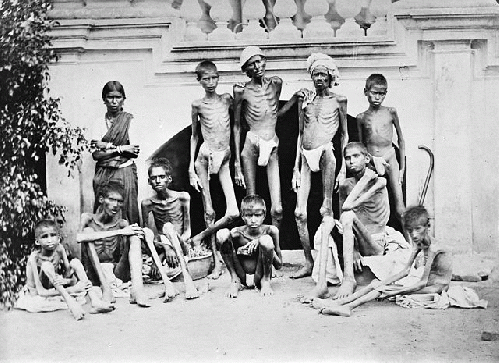"I know why the sun never sets on the British
Empire; God would never trust an Englishman in the dark."
---Duncan
Spaeth
"The conquest of the earth, which means the taking away from those who have a different complexion and slightly flatter noses than ourselves, is not a pretty thing when you look at it too much."---Conrad, The Heart of Darkness
The dominant narrative of standard textbooks teaching British Imperial History to unsuspecting school children is the folklore of swashbuckling intrepid buccaneers who overcame spear wielding savages with awe inspiring courage to build an empire based on the rule of law, justice and fair play for the benefit of the natives who were to be civilized with a firm paternal hand. As George Monibot sums up nicely:
"The story of benign imperialism, whose overriding purpose was not to seize land, labour and commodities but to teach the natives English, table manners and double-entry book-keeping, is a myth that has been carefully propagated by the rightwing press. But it draws its power from a remarkable national ability to airbrush and disregard our past."[i]
For the unfortunate natives who were the unwilling recipients of British imperial benevolence, it was a different story. For them British imperial rule was one of unrelenting cruelty, violence, racial bigotry and rapacious plunder of the subjugated colonies.
The narrative of airbrushed Pax Britannica imbued with benevolence and goodwill for the savage natives was reinforced by the imperial braying of Niall Ferguson who in his book Empire: How Britain Made The Modern World dwelt on the solemn duty of the imperial overlords to civilize the savages.
The fairy tale history of imperial benevolence received a rude jolt by the publication by such books as The Blood Never Dried: A People's History of the British Empire written by John Newsinger. Painting a bleak picture of British colonial rule where benevolence was in short supply, Newsinger acidly observes:
"One problem with contemporary apologists for empire, however, is their reluctance to acknowledge the extent to which imperial rule rests on coercion, on the policeman torturing a suspect and the soldier blowing up houses and shooting prisoners."[ii]
The relationship between the imperial masters and the conquered peoples was best described by Orwell who wrote in his book Burmese Days that "imperialism consisted of the policeman and the soldier holding the 'native' down, while the businessman went through his pockets". [iii]
The imperial coercion was best exemplified in the sugar slave plantations of British Caribbean which relied on Black slaves who worked in appalling conditions, brutality, and violence. The punishments meted out to slaves by the British planters would have shamed the efforts of Gestapo/ SS thugs in Nazi Germany. The list of punishments was draconian and made ones flesh creep with horror.
"For rebellion, slaves were usually punished by nailing them down to the ground and then by applying fire by degrees from the feet and hands, burning them gradually up to the head, whereby their pains are extravagant". For lesser crimes, castration or mutilation (chopping off half the foot) was the norm. And as for negligence, they are usually whipt after they are whipt till they are raw, some put on their skins pepper and salt to make them smart; at other times their masters will drip melted wax on their skins, and use very exquisite torture"[iv]
The Planter strategy behind such despicable methods was quite simple: "where slavery is established, and the population of slaves outnumbers their masters ten to one, terror must operate to keep them in subjection, and terror can only be produced by occasional examples of severity". [v]
Britain's involvement in the Atlantic Slave trade forms one of the most dreadful crimes against humanity. Called Maafa which means disaster in Swahili, it was operated as a triangular trade where British slave traders would exchange guns and brandy for slaves, then the slaves would be packed like sardines in slave ships and transported to West Indies and North America. In the last part of the transaction the slaves were exchanged for the cargo of rum and sugar to be sold in England for handsome profits. Conservative estimate suggests that 2.6 million slaves were transported by Britain. [vi] Millions of slaves died before they made it to the slave ships while one fifth of those who survived died in the course of the journey itself.
By the time slave trade was finally abolished in Britain in 1807, the 200 years of slave trade by Britain ruined the economy of Africa by constant wars and loss of able bodied men to work in the African economy. Africa fell back and began to be dogged with problems of underdevelopment. For the British pluck, courage and the buccaneering spirit paid off splendidly as the profits from the slave trade were invested in the Industrial Revolution. [vii]
Next Page 1 | 2 | 3 | 4 | 5 | 6 | 7 | 8
(Note: You can view every article as one long page if you sign up as an Advocate Member, or higher).





